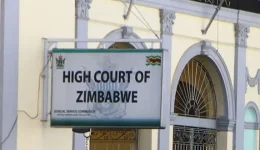In a groundbreaking decision, the Zimbabwe High Court struck down a controversial law that allowed immigration officials to hold foreign suspects for up to two weeks without any court oversight. Justice Christopher Dube-Banda ruled on November 12, 2024, declaring that section 8(1) of the Immigration Act goes against the country's Constitution. The judge said this law takes away people's basic rights, like freedom, dignity, and liberty.
Tatenda Chakabva, who lives in Harare, brought the case to court with help from the Zimbabwe Lawyers for Human Rights (ZLHR). He argued that the law let officials lock people up whenever they wanted, which goes against Zimbabwe's Constitution and international agreements that the country has signed onto, like the African Charter on Human and Peoples' Rights and the International Covenant on Civil and Political Rights. Chakabva had a team of lawyers, including Brighton Sadowero, Tinashe Chinopfukutwa, and Kelvin Kabaya, who fought for him in court.
Chakabva started the legal battle on May 28, 2024, by asking the court to say that section 8(1) doesn't match up with the Constitution. He said that the law lets immigration officers keep suspects in jail for up to 14 days without any court checking on them, which breaks the rule that anyone who gets arrested or detained must see a judge within 48 hours.
The Chief Immigration Officer tried to defend the law, saying that it was needed to fight big crimes like terrorism and human trafficking, which would make it okay to hold people for a long time without a court looking at their case. But Justice Dube-Banda didn't agree with this argument. He said that having a court watch over things is important to ensure that detained people have their rights protected and that keeping them in jail is allowed by the law. The judge also said that locking people up whenever officials want, without any court supervision, is against the law and messes with the idea of following the rules.
This court decision matches international and regional agreements about ensuring that detention is reviewed quickly. It also clarifies that Zimbabwe's immigration authorities can't hold people for long without a court's approval.
The High Court's ruling still needs to be approved by Zimbabwe's Constitutional Court before it can become official.
Tatenda Chakabva, who lives in Harare, brought the case to court with help from the Zimbabwe Lawyers for Human Rights (ZLHR). He argued that the law let officials lock people up whenever they wanted, which goes against Zimbabwe's Constitution and international agreements that the country has signed onto, like the African Charter on Human and Peoples' Rights and the International Covenant on Civil and Political Rights. Chakabva had a team of lawyers, including Brighton Sadowero, Tinashe Chinopfukutwa, and Kelvin Kabaya, who fought for him in court.
Chakabva started the legal battle on May 28, 2024, by asking the court to say that section 8(1) doesn't match up with the Constitution. He said that the law lets immigration officers keep suspects in jail for up to 14 days without any court checking on them, which breaks the rule that anyone who gets arrested or detained must see a judge within 48 hours.
The Chief Immigration Officer tried to defend the law, saying that it was needed to fight big crimes like terrorism and human trafficking, which would make it okay to hold people for a long time without a court looking at their case. But Justice Dube-Banda didn't agree with this argument. He said that having a court watch over things is important to ensure that detained people have their rights protected and that keeping them in jail is allowed by the law. The judge also said that locking people up whenever officials want, without any court supervision, is against the law and messes with the idea of following the rules.
This court decision matches international and regional agreements about ensuring that detention is reviewed quickly. It also clarifies that Zimbabwe's immigration authorities can't hold people for long without a court's approval.
The High Court's ruling still needs to be approved by Zimbabwe's Constitutional Court before it can become official.












